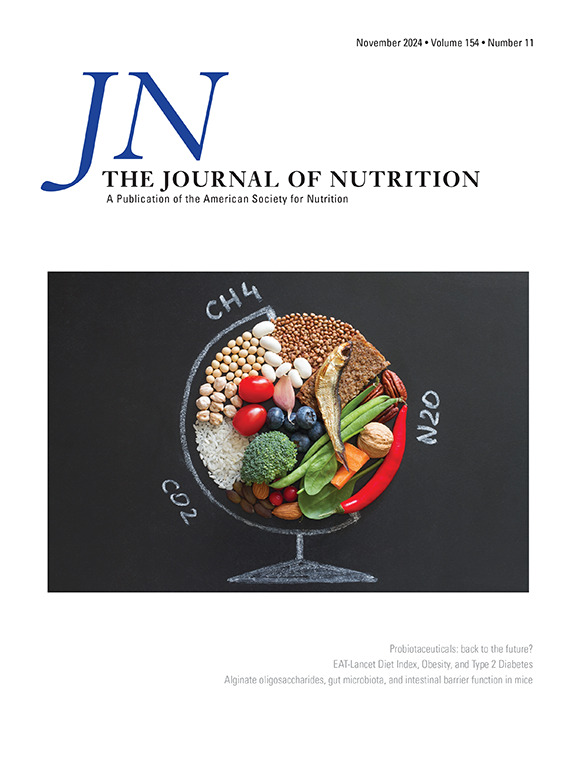增加全蛋摄入量的亚洲低碳水化合物饮食可改善代谢综合征患者的代谢结果:为期 52 周的干预研究。
IF 3.7
3区 医学
Q2 NUTRITION & DIETETICS
引用次数: 0
摘要
背景:低碳水化合物生酮饮食是解决代谢综合征(MetS)和肥胖症的有效策略,但也引起了人们对高脂肪摄入对动脉粥样脂蛋白影响的担忧:本研究的目的是比较亚洲生酮饮食(AKD)与平衡低热量饮食(BLC)在被诊断为代谢综合征患者中的效果:一项为期 52 周的随机临床试验包括三个平行组:方法:为期 52 周的随机临床试验包括三个平行组:增加全蛋摄入量的 AKD 组(蛋黄-AKD,n = 28)、补充蛋白的无蛋黄生酮饮食组(蛋白-AKD,n = 26)和 BLC 组(n = 22)。主要结果为人体测量和代谢变化:结果:AKD 组的体重和腰围均有明显下降(P < 0.05)。与 BLC 组相比,AKD 组在第 6 周时胰岛素抵抗明显改善,在第 12 周(卵黄-AKD)和第 35 周(白色-AKD)时甘油三酯水平明显改善(P < 0.05)。AKD组的胰岛素敏感性和食欲相关激素有所改善,而只有卵黄-AKD组的炎症相关激素显著下降(P < 0.05)。从第35周到第52周,与BLC相比,AKD组的人体测量指标和血压都有所下降,葡萄糖耐量得到改善,血脂状况得到改善,肝功能也有所改善:与 BLC 相比,AKD 被证明是安全有效的,能改善梅毒患者的各种代谢状况。这种方法强调低饱和脂肪饮食,同时不考虑膳食中的胆固醇,有望用于 MetS 和肥胖症的治疗。将白蛋-AKD 组和蛋黄-AKD 组都包括在内,可以全面评估 AKD 的影响,阐明全蛋食用对代谢结果的不同影响。有必要开展进一步的研究。该试验已在 clinicaltrials.gov 登记为 NCT04608136。本文章由计算机程序翻译,如有差异,请以英文原文为准。
Asian Low-Carbohydrate Diet with Increased Whole Egg Consumption Improves Metabolic Outcomes in Metabolic Syndrome: A 52-Week Intervention Study
Background
The low-carbohydrate-ketogenic diet, an effective strategy to address metabolic syndrome (MetS) and obesity has raised concerns about high-fat consumption on atherogenic lipoproteins.
Objective
The aim of this study was to compare the Asian ketogenic diet (AKD), which incorporates balanced protein and fat intake from Asian foods, with a balanced low-caloric diet (BLC) in individuals diagnosed with MetS.
Methods
A 52-wk randomized clinical trial included 3 parallel groups: AKD with increased whole egg intake [egg yolk Asian ketogenic diet (Yolk-AKD, n = 28)], yolk-free ketogenic diet with egg white supplementation [egg white Asian ketogenic diet (White-AKD, n = 26)], and BLC (n = 22). Primary outcomes were anthropometric and metabolic changes.
Results
The AKD groups achieved significant reductions in weight and waist circumference (P < 0.05). Compared with the BLC group, the AKD groups demonstrated significant improvements in insulin resistance at week 6 and in triglyceride concentrations at weeks 12 (Yolk-AKD) and 35 (White-AKD) (P < 0.05). The AKD groups experienced improvements in hormones associated with insulin sensitivity and appetite, whereas only the Yolk-AKD group had a significant decrease in inflammation-related hormones (P < 0.05). From weeks 35–52, the AKD maintained reductions in anthropometric measurements, blood pressure, improved glucose tolerance, enhanced lipid profiles, and better liver function compared with the BLC.
Conclusions
The AKD proved safe and effective, yielding various metabolic improvements in individuals with MetS compared with the BLC. Emphasizing a low-saturated fat diet while disregarding dietary cholesterol, this approach holds promise for MetS and obesity management. The inclusion of both White-AKD and Yolk-AKD groups allowed for a comprehensive assessment of the AKD's impact, elucidating the differential effects of whole egg consumption on metabolic outcomes. Further studies are warranted.
This trial was registered at clinicaltrials.gov as NCT04608136.
求助全文
通过发布文献求助,成功后即可免费获取论文全文。
去求助
来源期刊

Journal of Nutrition
医学-营养学
CiteScore
7.60
自引率
4.80%
发文量
260
审稿时长
39 days
期刊介绍:
The Journal of Nutrition (JN/J Nutr) publishes peer-reviewed original research papers covering all aspects of experimental nutrition in humans and other animal species; special articles such as reviews and biographies of prominent nutrition scientists; and issues, opinions, and commentaries on controversial issues in nutrition. Supplements are frequently published to provide extended discussion of topics of special interest.
 求助内容:
求助内容: 应助结果提醒方式:
应助结果提醒方式:


